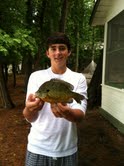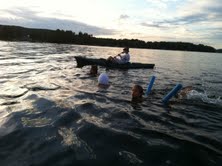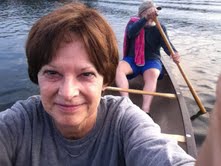We’ve called our cottage “Brown’s Health Farm,” but this last week’s been mostly cold and rainy, not great for the usual swimming, kayaking, biking, walking—and my daughter Kelly and family are here, all six of them. The boys went out fishing early yesterday—the best day, supposedly some sun coming—but the sky opened up and they sat for a while under the Ellsworth Bridge and then the Central Lake bridge before heading home, soaked. They did catch some pike and gar, pretty big, and threw them back. My grandson Noah would rather fish than breathe. If there are fish to be caught, he catches them. Here he is with the biggest sunfish I’ve ever seen. 
We have a tradition of swimming across the lake and back every summer.  Our lake is seven miles long but our cottage is at the narrowest point, ¼ mile across. In the old days, one could swim across without a guardian. Now the big boats necessitate a couple of kayaks or canoes, one on either side. I’m always one of the swimmers, but not this year. The water’s cold from so much rain and I’m not sure I have that much strength yet. With only Kelly’s family here at the moment, it was a small crossing, but we did uphold the tradition, plus the cherry pie afterward. Josh wore my hilarious, ruffled cancer swim cap.
Our lake is seven miles long but our cottage is at the narrowest point, ¼ mile across. In the old days, one could swim across without a guardian. Now the big boats necessitate a couple of kayaks or canoes, one on either side. I’m always one of the swimmers, but not this year. The water’s cold from so much rain and I’m not sure I have that much strength yet. With only Kelly’s family here at the moment, it was a small crossing, but we did uphold the tradition, plus the cherry pie afterward. Josh wore my hilarious, ruffled cancer swim cap.
Being in this normal life, with its usual frustrations and joys, is a bit hard after this winter. I go along playing jacks with my granddaughter Abby, building a fire, planning how to feed this brood, and I forget the cancer for a while. When it comes back to me, it's a surprise all over again, a sinking. A gloom settles in and only gradually moves to the back shelf of my mind.
Everything’s the same here, as it has been at our cottage for 95 years. But nothing is the same because there never was a “same.” Everything’s been shifting all along. It’s so interesting to me that the ghosts of my great-grandparents, my grandparents, my parents, are floating all over the place. There’s running water now, but there’s also in my mind the well, the pump. There’s the old dock on sawhorses as well as the new, wide one on metal brackets. There’s the old kitchen with the washtubs and the new one with a double sink. The old life is simultaneous with the new one in my mind, one as real as the other and both of them speaking in some way to each other. 
The mind makes the world. So what will my grandchildren see? I think more about my mortality, of course, of what they’ll remember, how my ghost might be a benefit to them in some way, as my Grandmother Brown’s been for me. Her ashes are still here, but it’s her living presence in my mind that matters. I can almost hear her voice.
I never forget how incredibly fortunate I am to have my childhood intact in these woods, in this cottage. There’s a Spanish word, querencia, I found in Christopher Columbus and the Conquest of Paradise by Kirkpatrick Sale (I highly recommend). According to Sale, it means much more than “love of home.” It means “a deep, quiet sense of inner well-being that comes from knowing a particular place of the earth, its diurnal and seasonal patterns, its fruits and scents, its history and its part in your history and your family’s.” When you’re there, your soul gives a sigh of recognition and relaxation. Your compass points directly down. Columbus didn’t have that, apparently. He spent his life wandering. I do have it. This is my place. When I’m here, my body’s perfectly aligned with the universe.
Oddly, even though I have those sinking times, at the same time I feel a part of an ongoing movement, generation to generation and shifting of one tradition into another, a sense of being relaxed into that movement and content to have/have had my part in it. My hunch is, I still have a number of good years. I could be wrong. But it feels as if my absence will be more like another shifting of things, like getting electric lights in place of the old kerosene lamps. Eventually the cottage will need to be torn down and another one built. Eventually all this will be forgotten. But it will still be there, simultaneous with the new, in some way I can’t understand with my mind, in the way everything is here at the same time, influencing and informing what we call the present.
